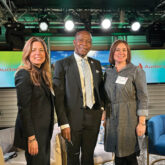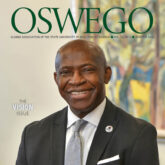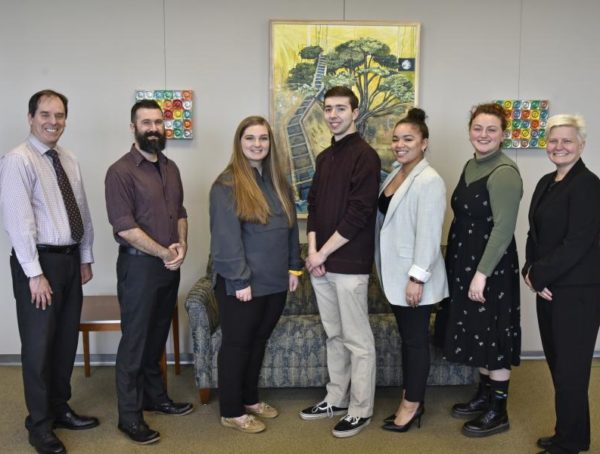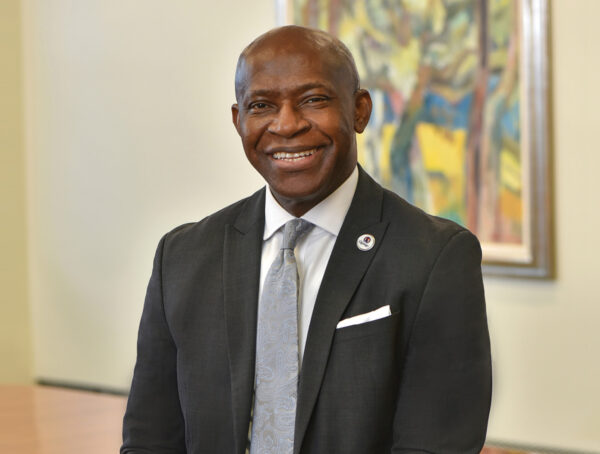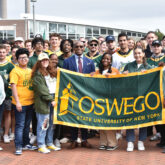Seven Ways to Be an Effective Leader
by Deborah F. Stanley, Sept. 5, 2013
-
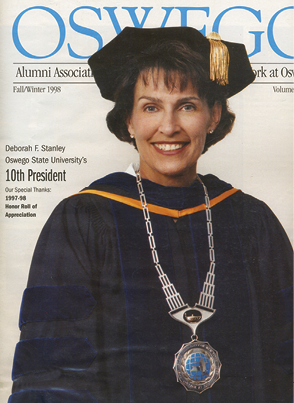
Deborah F. Stanley, the 10th president
of SUNY Oswego, is pictured here on
the cover of the Fall/Winter 1998 issue
of the OSWEGO Alumni Magazine in
her inaugural regalia. The weeklong
celebration of her inauguration included
a community reception at City Hall, art
exhibitions in Tyler Hall, the Fall Classic,
Energy Issues Forum and the Sheldon
Lighting Ceremony.Foster a “why” mentality and culture. And a “what if we didn’t do it that way” investigation. That means to look at everything from its opposite or at least from a different perspective as a matter of course. Some people call this playing the Devil’s advocate. But it is really being thorough and not reflexively accepting prevailing wisdom without a thought. I don’t do this to be contrary or to make a sport of poking holes in someone else’s opinion. Of course—I am an attorney—I am trained to challenge. I also believe it is important to challenge current thinking—your own and others, even if the result is to prove it right. For me, turning an idea or a problem around to look at every side keeps us thinking fresh, encourages deeper analysis of situations and always yields new ideas.
- “Let it steep.” Give things—initiatives, decisions, impressions—time to brew. In American culture we often place a high value—not only in decisive action—but quick action. One of the best pieces of advice I ever received was to put a tough question—a complaint, a request, a press inquiry (as long as it’s not an emergency) aside—think it thru, perhaps seek expert advice, study the issue, and assess likely outcomes before taking action. That might take a few hours or a few days—or even longer. Move when it is ripe and right! Often you won’t be able to have a “do over” so it will be best to make a clear headed and informed decision as your first course of action.
- Remember the Golden Rule. Value being human and express the value you have for others in words and deeds. This is good for you and good for the organization. Human beings are not perfect and until or unless we live and work in totally solitary environments, work will never be “not personal”. Some of the more alienating and impersonal practices in our workplaces are sometimes a surrogate for strength. We are choosing to send a message to many anytime we interact with anyone in our workplace. And the message is never just about work—even if you never talk about anything else you will be judged on the way you treat the individual—on the respect, compassion, fairness, dignity you do or don’t display. You can make the world of working with you unsafe in ways that lead to risk averse, morbidly competitive, and concealing behaviors or trusting, open, safe, entrepreneurial, GOOD. This is more an ethic of a work culture than merely of one-off behavior—it is maintained in meetings, with customers and clients, and throughout the organization.
- Pay it forward. Hard as it may be to believe—the world is going to outlive you! And although we would all like to believe that no one could be as wonderful, smart, accomplished and—well, just perfect—as we are, if leadership counts—and I believe it does—it is incredibly worthwhile to spend time cultivating, encouraging, and guiding the next generation so they will be ready—confident and experienced—to take the reins. It is an act of generosity not of pride or ego. One of the most humbling things in life is recognizing that you are a role model. But if you embrace it, being a mentor has benefits not only for your protégé—but also for you in living the examined life that Plato tells us is worth living.
- In higher education we talk about ’habits of the mind’. Make being a constant learner—a seeker of knowledge not just information—your main habit. It takes a bit of humility to recognize that this vast world will never be fully known—and even more to absorb that in this era of vastly expanding knowledge in about every field, you will never know it all. Yet, I am not speaking about only formal learning. A dynamic intellectual life is built on being open to the ideas of others and inquisitive about how things work and work together. Getting outside of your bubble–learning a new activity, experiencing a foreign culture, or even doing something quite ordinary that is new to you—gardening, bird watching, can turn on a light bulb to understanding many other things in life and perhaps increase your insight about yourself.
- Only taking action can achieve positive change. I am not a fan of the symbolic action—of just doing something so it doesn’t look like you don’t have a plan. You can and should consult, deliberate, test, you can also run a pilot (that’s my favorite—a particular pet of higher education) do pro forma work ups, consult an astrologer—but if you are waiting for a no risk situation or a perfect solution—change may organically occur but it can’t lead transformative and holistic change. When you act, you might not hit the mark exactly – not all action makes positive change–but sometimes the best way to advance is to fall short—take one step backwards in order to gain two leaps forward. It is a marker that will light the way and define when the road turned toward success.
- Refill the well. Our culture is about performance and perfection, about achievement and winning—we value work and hard driving habits, but unless you follow your bliss (Joseph Campbell)—at least a good proportion of the time, you are guaranteed to run dry. If that happens—it hurts every aspect of your life—family and friends are put off—ailments are magnified and work will suffer too in lack of creativity, interest, motivation, and focus. Of course, as Americans we have to be careful not to make play feel like work. Replenishment can come in many forms but we must be intentional about integrating our lives in this way to live a more satisfying and joyful life.
You might also like
More from Featured Content
Vision for the Future
VISION for the Future Peter O. Nwosu began his tenure as the 11th president of SUNY Oswego, building on the solid …
Envisioning the Potential in All Students
ENVISIONING the Potential in All Students Educator donates $2 million in recognition of his Oswego education, in support of future teachers Frank …
A Vision of Support
A VISION of Support Award-winning principal makes an impact on her school through her positivity and commitment When Nicole Knapp Ey ’02 …




